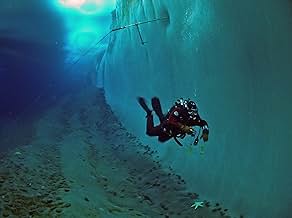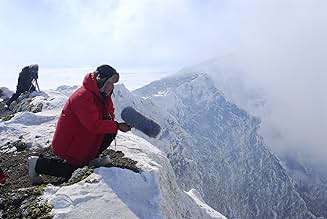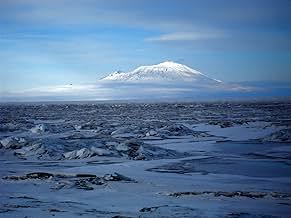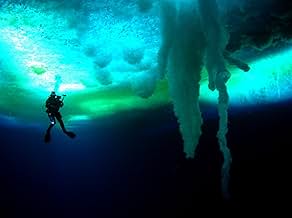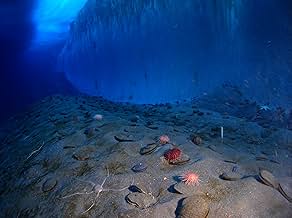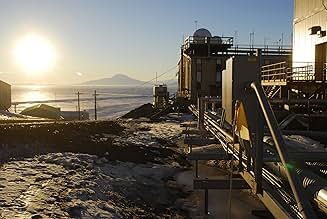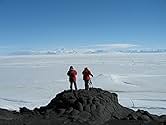Unisciti a Werner Herzog in viaggio verso la stazione McMurdo in Antartide, cercando di catturare la bellezza del continente e indagare sui personaggi che vivono lì.Unisciti a Werner Herzog in viaggio verso la stazione McMurdo in Antartide, cercando di catturare la bellezza del continente e indagare sui personaggi che vivono lì.Unisciti a Werner Herzog in viaggio verso la stazione McMurdo in Antartide, cercando di catturare la bellezza del continente e indagare sui personaggi che vivono lì.
- Regia
- Sceneggiatura
- Star
- Candidato a 1 Oscar
- 2 vittorie e 16 candidature totali
- Self - Glaciologist
- (as Douglas MacAyeal)
- Self - Filmmaker, Cook
- (as Ryan A. Evans)
Recensioni in evidenza
This is a large canvas, perhaps slightly difficult to put in proper words. Above all, all of the ideas and thoughts within the movie stems largely from the viewer's own imagination, Herzog is merely - with his warm and serious, yet inexplicable witty, narration - planting the mental seeds and asking the questions, some rhetorical and some forever impossible to answer. And it is remarkable how he does this, how this film is designed. All throughout, Herzog moves about like a genuine tourist and at the beginning I am surprised how spontaneous the whole idea feels, almost as if I am actually watching a private home video made for personal remembrance. The only difference being of course, that it would be the kind of home video Herzog would make. And be that as it may, this is still a great movie, because it continues from this elementary first stage of how he travels to the station, combined with stock footage of the explorers of the 1800s, into that of a true thinker's exploration in a romantic setting. The form of the film gradually evolves, first small steps with the reality of the small, modern society that has been developed, the paradox of a restaurant with a beloved ice-cream machine (needless to point out further, and despised by Herzog), and with a scene of people having an unusual way of training, in case they would get lost in a blizzard. From then on, at least I was hooked and from these minor steps of humanity looking itself, if but slightly, in the mirror, the movie blossoms into a greater and greater abyss of questions that human beings will always feel the hunger to answer, questions they never will be able to answer but questions that human beings will always need to have.
Human beings, now there's another thing. Herzog encounters a lot of inhabitants of the station and gets to know them, and while not to say that there aren't interesting people throughout the movie, but here we have the adventurous woman who has her own party trick where she amuses people by becoming luggage. She has many stories to tell, like how she hitch-hiked from USA to Africa in a sewer pipe. Another man claims he once survived getting killed by the mayans . There are others with less dramatic things to say. Like one of the biologist divers, slightly sad since he's decided that at that very day he will perform his last dive. He feels like his job is done. Another man is simply showing how he has two fingers of the same length, which would prove that he's got Aztec blood in his veins. Or so they say.
You might understand what I'm getting at. In these very sequences of utter realism, we do get to feel the fresh air of a normal day out at the Antarctica. And it helps settle the notion that this is a film about humanity. We are constantly in the real world, with real people, in contrast to Grizzly Man (2005), Herzog's previous nature documentary, where we were indeed surrounded by breathtaking nature, but we were also viewing the Timothy Treadwell show, put on by the star persona of himself, if there ever were another. Here we meet the actual answer to Treadwell's love to nature. Science, philosophy, mere being in the never ending light over the ices. Herzog seems very much in love with nature, be it ice skies underneath the surface, or active, thundering volcanoes or just the remarkable penguin scene that could break your heart (even Herzog could not resist one of those sentimental scenes directed by nature, despite even claiming early on that this is "not a penguin film"). It may be penguins, but it's hauntingly beautiful nonetheless.
Throughout the movie, Herzog keeps expanding his view on nature and humanity until we reach the end, and the topic we've all been waiting for. The climate change. As you'd expect though Encounters at the End of the World is by no means a propaganda film, it would obviously be beneath Herzog's dignity. No, it seems like Herzog quietly accepts that mankind might be headed for doom - it's as natural as the deranged penguins leaving it's flock to never return - and instead asks what alien lifeforms might think of our remains if they would land to explore in thousands of years. Yes, the explorations goes on. And I think it is importance to remember that the end of the world is not the end of the world. Mother Earth will be alright. She has all the time in the universe. Makind however, we may be getting near the end. I can't help but feel, when I see the colossal, wide, arctic images and the spreading cancerstain of urbanism, that after all mankind has done, Mother Earth deserves to be left alone for a while. There has to be some peace and quiet in the Universe. If the aliens do land, and they do study our hideouts, and they do feel confused over finding a fish deep down in a tunnel in the Antarctica; I'd suggest they'd watch Encounters at the End of the World.
Interestingly, it seems that this is less by design than by accidents that occur because he chooses to put his camera in places where the cosmos is unstable. Sometimes it rewards deeply, because we find our own window into beautiful chaos. Sometimes the experiments fail, and you can see how he has tried to distract us with observations from himself rather than the world he has placed us in.
This is such a failure. He goes, enticed by the promise of cruel, unfathomable beauty. He finds no accident with inherent narrative, so he inserts his own. Unfortunately, Herzog the man and mind is the least interesting element of any Herzog film. I know I am in the minority here, because he has a celebrity persona.
But watch this, and see how he interviews his subjects. He is trying to cast them as beautiful souls doomed be a part of the ugliness of humanity. Some of the interviews are staged or rehearsed. He admits this. I know the words are genuinely from the people who speak them, but the narrative is false. Herzog has this notion — this essentially Austrian notion — that nature is only full when it is cruel, stark and dangerous. Humanity is unnatural; only a few butterfly souls escape, and they are to be cherished.
So look here: we have his usual Wagnerian chorus, using internationally fused sounds. We have some nature, always presented as cosmically unfriendly. We have episodes that underscore the hopeless weakness of society. And we have characters that engage and inspire. But it all seems so desperately constructed here. Whether he likes it or not, he has simply made a penguin film, but with humans.
Ted's Evaluation -- 2 of 3: Has some interesting elements.
My complaints are essentially twofold. First, the movie is disjointed. It is a hodgepodge of Herzog's encounters with various Antarctic researchers and residents; there is no apparent order or theme. This is a minor criticism, as most of the segments make for fine viewing on their own, but it would have been more satisfying if Herzog had presented a unifying thesis or two about the Light Continent (aside from the oft-repeated observation that it is populated by a fair number of "professional dreamers"). He should have at least arranged the segments in a clearly meaningful sequence. At its best, the film made no more of an impression on me than "that was beautiful," "that was cool," or "I didn't know that." Second, and more significantly, Herzog's narration is at times irritating. As someone who has studied climate change, I share his frustration and pessimism. But there is no call for saddling the film's final moments with apocalyptic platitudes (e.g., "the end of human life is assured") and a cursory reference to global warming. These sentiments are incongruous with the rest of the film, which does not substantially address environmentalism and whose most haunting scene is of a mad penguin that abandons its flock and runs inland towards distant mountains, to certain death, with a singular determination. Herzog's doomsayings, in any event, are better communicated by the satellite images of rapidly melting polar ice that we observe on a climatologist's computer screen. I know that Herzog is capable of more measured reflections on the impersonal and uncontrollable power of nature; for example, from Grizzly Man: "what haunts me is that in all the faces of all the bears that Treadwell ever filmed, I discover no kinship, no understanding, no mercy. I see only the overwhelming indifference of nature. To me, there is no such thing as a secret world of the bears. And this blank stare speaks only of a half-bored interest in food. But for Timothy Treadwell, this bear was a friend, a savior." In Encounters, Herzog superficially and self-indulgently overstates his case. I'm looking forward to his next film.
But, the film STILL is mesmerizing. You learn about the very unearthly sort of sounds the seals make under the ice, the sad story of a mixed-up penguin, some amazing volcano research and lots of odd facts about this MOSTLY desolate continent. Well worth seeing--just don't be too turned off by the occasionally bizarre dialog.
"There is no point that is south of the south pole." That's a no brainer, but have you ever thought about that before reading that statement? Such a simple and obvious saying, yet there's something quite poignant buried within it. It's pointed out by one of Werner Herzog's dreamers - a philosopher and part time forklift driver - that he found on his encounters at the end of the world.
Herzog begins his new documentary warning us that this will not be another film about fluffy penguins; his questions about nature are far different. For example, why does a sophisticated creature like a chimp not make use of inferior creatures - they could saddle goats and ride off into the sunset. Herzog delivers with a pondering and quizzical film. Encounters at the End of the World is about the intricacies - and insanities - of life on Antarctica. His visit was spurred on by the footage taken by one of the under-ice divers, a friend of his. He opens the film with the images of what appears to be hauntingly blue skies and bubbly white clouds, but its not skies nor clouds, but the clear waters and hulking ice. Herzog, always fascinated with the oddity and great beauty of the natural world, fills his documentary with stunning images and sequences. Underwater divers film strange creatures under the ice, and massive ice formations while navigating their way back to the single hole in the ice, without tether lines to guide them. Volcanologists traverse dormant lava tubes, only having to be weary of poison gases that can be found in some.
Herzog's base of operations is McMurdo, the largest settlement on the continent. He describes it as an ugly mining town. And it is ugly. It's filled with scientists, wanderers, adventurers and dreamers, all looking to 'jump off the margins of the map,' as one observer puts it. It also has "abominations" such as aerobics and yoga studios, even an ATM. Before he go in the field, he, like everyone else, must attend survival school, where among other things students learn to build shelter, and then must spend the night in it. They also partake in a white out simulation, achieved by wearing white buckets on their heads. They wander out to find the instructor, playing a lost peer. As they get disorientated, the scene becomes comical, but also points out our inferiority when up against nature.
Herzog does make a stop to visit some penguins briefly, and the man who studies them - reportedly no longer much of a conversationist with humans since he spends so much time isolated with penguins. Herzog's questions are amusing, but thoughtful. "Are there gay penguins?" "Is there such thing as madness among penguins?" The answer to that last question leads to one of the films most memorable and profound sequences.
The film at once is an admiration of those who find themselves working at the end of the world, and an admonition of the manipulation of adventure. Herzog wastes no time on the uninteresting people there. He talks with a scientist who describes a horrifying world that would tear us apart - if it were not too small to be seen by the human eye. He also shows old science fiction movies and warns of our fate. Some of them gather during the night, still day lit, for a jam session on top of their hut.Another woman discusses how she rode through South America in a sewer pipe, then zips herself into a travel bag. Another man, a plumber, says his hands prove that he is descended from Aztec and Inca royalty. On the other hand, he admonishes the notion of adventure for conquer. Shackleton came not for the sake of adventure, but to claim the South Pole. He almost lampoons some of his subjects, but is never disrespectful and clearly admires all of them.
The name of the film is something of a double entendre. Herzog frequently ponders another life after humans are gone. What would they think of us when they come see what we're doing in Antarctica? There are references to global warming and threats to our planet, but Herzog is no issue of the day crusader. So many other documentaries would condescend to us, and have. Green has become the fad of the day, annoying many instead of enlightening. Herzog is too much of an enigma to pander or preach to us, and that's part of the reason why Encounters at the End of the World is so special.
Werner Herzog is a man incapable of making a dull film. What is entirely true in this documentary is questionable as it is in his others. His pursuit of ecstatic truth - semi-fictions to capture the essence of what is more truthful than truth - gives him license to embellish. But no matter, if he has some of his interviewees script some details, I do no care to know which. I'm happy being mesmerized by the stories they tell as is.
For me, a Werner Herzog film is like pulling on a warm pair of slippers on a cold winter day, and pulling up by the fire to read a favorite book. Herzog was one of the first filmmakers to draw me into the world of great film-making, and for that I forever owe him a great debt of gratitude. And it was Roger Ebert who lead me to him, so how fitting that this beautiful film was dedicated to him.
Lo sapevi?
- QuizWerner Herzog dedicated the film to Roger Ebert, who he calls a true "warrior of cinema". Due to the dedication Ebert could not review the film, but he wrote a complimentary letter to Herzog and later published it.
- Citazioni
[last lines]
Stefan Pashov: There is a beautiful saying by an American philosopher, Alan Watts. He used to say that through our eyes the universe is perceiving itself, and through our ears the universe is listening to its cosmic harmonies. And we are the witness to which the universe becomes conscious of its glory, of its magnificence.
- ConnessioniEdited from Assalto alla terra (1954)
- Colonne sonorePlanino Stara Planino Mari
Written by Stefan Dragostinov
Performed by The Philip Koutev National Folk Ensemble
I più visti
- How long is Encounters at the End of the World?Powered by Alexa
Dettagli
- Data di uscita
- Paese di origine
- Sito ufficiale
- Lingue
- Celebre anche come
- Encounters at the End of the World
- Luoghi delle riprese
- Aziende produttrici
- Vedi altri crediti dell’azienda su IMDbPro
Botteghino
- Lordo Stati Uniti e Canada
- 944.933 USD
- Fine settimana di apertura Stati Uniti e Canada
- 17.730 USD
- 15 giu 2008
- Lordo in tutto il mondo
- 1.205.464 USD
- Tempo di esecuzione1 ora 39 minuti
- Colore
- Mix di suoni
- Proporzioni
- 1.78 : 1
Contribuisci a questa pagina








